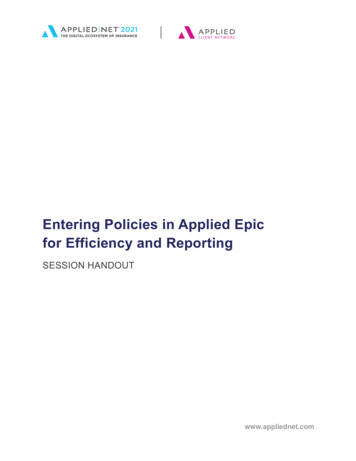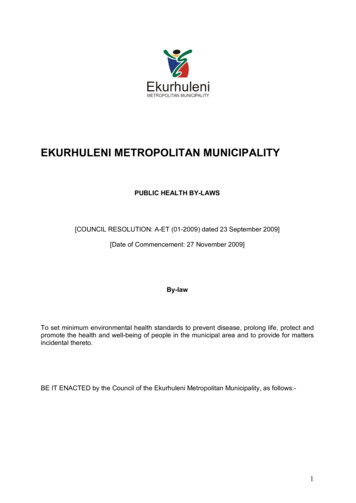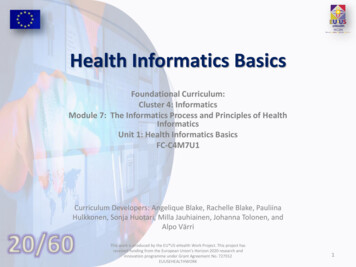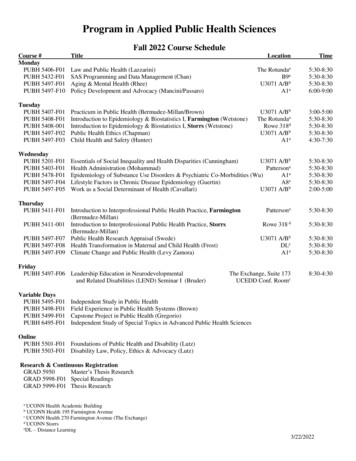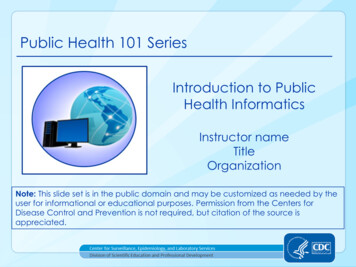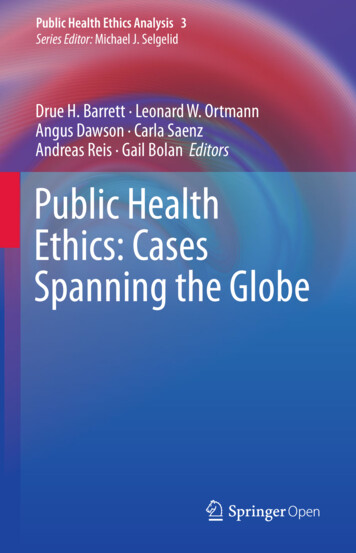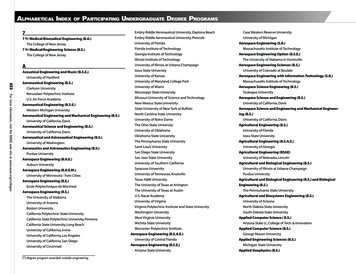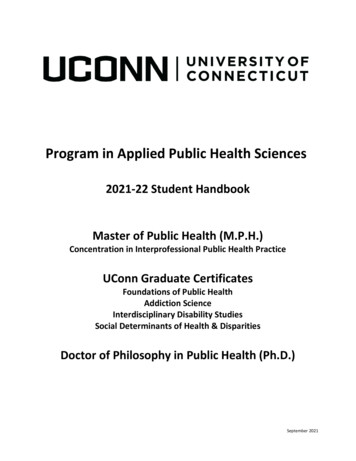
Transcription
Program in Applied Public Health Sciences2021-22 Student HandbookMaster of Public Health (M.P.H.)Concentration in Interprofessional Public Health PracticeUConn Graduate CertificatesFoundations of Public HealthAddiction ScienceInterdisciplinary Disability StudiesSocial Determinants of Health & DisparitiesDoctor of Philosophy in Public Health (Ph.D.)September 2021
Table of ContentsProgram and Graduate School AdministrationPage1Master of Public Health (M.P.H.) DegreeM.P.H. ValuesM.P.H. MissionM.P.H. Goals and ObjectivesM.P.H. Application ProcessM.P.H. Degree Requirements – Standalone optionM.P.H. Degree Requirements – FastTrack (4 1) BA/BS M.P.H. optionM.P.H. Degree Requirements – Dual degree optionsM.P.H. Learning ObjectivesM.P.H. Foundational CompetenciesM.P.H. Concentration-specific CompetenciesPortfoliumWaivers and Transfer of Credits Toward the M.P.H. DegreeSatisfactory Academic PerformanceM.P.H. Applied Practice Experience (APE) – The PracticumM.P.H. Integrative Learning Experience (ILE) – The Thesis or Capstone ProjectM.P.H. Academic AdvisementM.P.H. Course RegistrationM.P.H. Tuition and FeesM.P.H. Degree Conferral DeadlinesRecognition of Exemplary Student PerformanceStudent Life222345689101010101111131415151616UConn Graduate CertificatesCertificate - Foundations of Public Health (CFPH)Certificate - Addiction Science (CAD)Certificate - Interdisciplinary Disability Studies in Public Health (CDSPH)Certificate - Social Determinants of Health and Disparities (CSDH&D)Certificate - Application ProcessCertificate - Tuition and FeesUConn Graduate Certificates and M.P.H. Degree Requirements16171717171718Doctor of Philosophy in Public Health (Ph.D.)Ph.D. Program LengthPh.D. Degree RequirementsPh.D. Application ProcessPh.D. Customary Course LoadPh.D. Tuition and FeesPh.D. Residency RequirementPh.D. Plan of StudyPh.D. AdvisementPh.D. Transfer of Credits and Advanced StandingPh.D. Continuous RegistrationPh.D. Interim Progress ReportsPh.D. General ExaminationPh.D. Dissertation Proposal and Research PhaseRequired AttendanceProgram r 2021
Operational Details – Program in Applied Public Health SciencesUniversity Communications and Email AccountsBackground ChecksUniversity IDImmunizationsCOVID Vaccination ReportingHealth InsuranceRequired TrainingLibraryLearning ResourcesSoftwareStudent ParkingCode of ConductStudent Rights and Assurances - Family Educational Rights and Privacy Act (FERPA)Scholarly Integrity in Graduation Education and Research2828282828282929292929303031Useful web addressesAcademic CalendarCITI TrainingHuskyCTM.P.H. emailPeopleSoftUConnUConn Graduate School CatalogUConn HealthUConn Health Graduate SchoolUConn Health Institutional Review Board (IRB)UConn Health RegistrarUConn M.P.H. du/registrar/https://mph.uconn.edu/September 2021
1UConn Program in Applied Public Health SciencesThis handbook is a guide for students, to be used with the rules and procedures of the UConn Graduate School Catalog(see: https://gradcatalog.uconn.edu/). Complementary information is available (see: https://mph.uconn.edu/).The UConn Department of Public Health Sciences offers the Master of Public Health (M.P.H.), the Doctor of Philosophy(Ph.D.) and several Graduate certificates. The Program in Applied Public Health Sciences operates under dualsupervision of the School of Medicine and UConn Graduate School. The following figure depicts both the variouscomponents of our program and lines of authority.Program and Graduate School AdministrationUConn administrators, faculty and staff are readily available to students in order to ensure a positive experience duringtheir course of study. The Program maintains an information line (860-679-5470) where you can leave messages for laterreview.Program in Applied Public Health Sciences – 195 Farmington Avenue, Farmington CT 06030-6325David Gregorio, DirectorStacey Brown, Applied Practice CoordinatorJane Ungemack, Dual Degree CoordinatorDavid Gregorio, PhD CoordinatorHolly Samociuk, Program AssociateHillary Barigye, Program AssociateDanica Brown, Program AssociateMichael Abate, Technical Analyst -5467860-679-5467860-679-5479UConn Graduate School - 263 Farmington Avenue, Farmington CT 06030-6325Barbara Kream, Associate Deankream@uchc.eduRebecca Straub, Administrative Officer, UCHC Registrar registrar@uchc.eduCharley Rowland, UConn Health 0-679-1632September 2021
2Master of Public Health (M.P.H.) DegreeThe M.P.H. degree is intended for students seeking practice-based careers in governmental service, non-governmentalagencies, health care organizations and academia. The M.P.H. degree requirements conform to those of the UConnGraduate School, as well as standards specified by the Council on Education for Public Health (CEPH), the independentagency recognized by the U.S. Department of Education to accredit public health schools and programs. UConn’sM.P.H. Program has been fully accredited by CEPH since 1984. Our M.P.H. degree offers a concentration in AppliedPublic Health Sciences.ValuesOur Program in Applied Public Health Sciences, consistent with the values of our University and the principles of publichealth practice, prioritizes the following values: Population centric – putting public concerns and needs above individuals or the profession. Evidence based – utilizing best available information to inform decisions and actions in the practice of publichealth. Social justice – believing that wellness is a public good and fundamental right of all individuals. As such, wechallenge the basis of health inequity wherever it occurs. Engagement – fostering reciprocal, equitable partnerships among stakeholders to distribute responsibilities forselection, implementation and assessment of public health activities. Teamwork – functioning across disciplines and circumstance to achieve integrated, cohesive approaches tocommunity concerns. Advocacy – increasing awareness and support for a robust, comprehensive public health agenda. Resolve – preparing lifelong learners to address current and emerging public health challenges. Integrity – promoting the highest standards of objectivity and accountability in work and interpersonal relations. Respect – incorporating differing beliefs, cultures and practices into all program activities.MissionIn furtherance of our program’s vision, the mission of our program in Applied Public Health Sciences is to offer anexemplary academic environment that prepares interprofessional learners to achieve high standards of public healthpractice. Public health careers for the 21st century, along with many in the related health and human services, willrequire competence in interprofessional practice that coordinates skill sets and perspectives of various disciplines inpursuing effective, comprehensive, systems-level improvements to our environment and social structure.Competencies of interprofessional practice refer to the capacity of individuals and teams to enact knowledge, skills,values and attitudes essential for working together across professions and stakeholder groups to improve outcomes.Goals and ObjectivesConsistent with our program’s values and mission, we pursue the following 5 goals and 17 measurable objectives:Scholarship of Integration (Interprofessional Goal) We will sustain an environment wherein students, staff, faculty andcommunity partners build partnerships and gain firsthand knowledge and collaborative experiences across disciplinesof public health, law, social work, pharmacy, medicine, dentistry, basic sciences and engineering, education,rehabilitation, public administration and allied health professions.Goal:To recruit and prepare students to earn the M.P.H. degree, while encouraging their collaborativeengagement with students, faculty and programs across the university and among relevant communitybased stakeholders in order to enhance the delivery of systems level approaches to healthpromotion/disease prevention in populations.Objectives: Provide options for public health students to pursue professional (dual) degrees that integrate publichealth, clinical and non-clinical disciplines.Encourage and accommodate enrollment of students from across the University and the community intopublic health courses.Scholarship of Teaching (Education Goal) We will be innovative in the delivery of curriculum, the provision ofexperiential learning options and the evaluation of curricular practices.Goal:To prepare, through exemplary didactic and experiential learning, competent public health practitionerswho know and demonstrate interprofessional understanding of public health, medicine, dental medicine,September 2021
3nursing, pharmacy, law, social work and public administration.Objectives: Offer a competency-based curriculum.Facilitate global learning and research by faculty and students.Assure graduates are competent practitioners of public health.Nurture diversity of experience in interest in faculty, students and program staff.Maintain appropriate faculty to deliver exemplary curriculum.Scholarship of Application (Service Goal) We will be active proponents and policy developers to favorably affect thesocial determinants of health and the delivery of public health services.Goal:To enable students, staff, faculty and community-based partners to contribute competent, collaborativeeffort toward assuring healthful, satisfying lives of Connecticut residents and beyond.Objectives: Promote continuing education/lifelong learning across public health specialties.Emphasize service learning throughout the curriculum.Support career development among the public health workforce.Scholarship of Discovery (Research Goal) We will support activities that increase our understanding of the social,behavioral, physical and biological bases of population health and health service delivery.Goal:To uncover determinants of health and well-being and disseminate that information in support ofevidence-based health promotion/disease prevention practices for populations.Objectives: Prepare students to design, undertake and disseminate relevant public health research.Promote ethical, compassionate and culturally appropriate public health research.Promote research focused on causes and control of inequities in health.Scholarship of Administration (Leadership Goal) We will continually examine our efforts to prepare competent,successful and satisfied students, support the work of faculty, staff and community partners and have meaningfulimpact on the well-being and prosperity of our community.Goal:To effectively utilize University, program and community resources to sustain a high quality, high impactprogram in academic public health. In doing so, UConn’s Program in Applied Public Health Sciences will berecognized as the leading academic institution preparing leaders in the interprofessional practice of publichealth.Objectives: Identify and retain qualified faculty, within and outside of public health to serve as academic advisors andinstructors of public health students.Recruit and retain diversity among students, faculty and staff.Secure necessary financial and material resources to fulfill our mission, goals and objectives.Communicate effectively with stakeholders and the community-at-large in advocacy of our discipline andeducational offerings.Application ProcessApplicants for the M.P.H. degree are expected to demonstrate a strong academic record, background and/orexperience relevant to public health with well-articulated career goals that reflect their focus and commitment to thehealth of the community. Application to our program is through the UConn Graduate uconn/). An application fee, unless a fee waiver is aiver-policy/), is required.Without substantial justification, applicants are only considered for Fall enrollment and are strongly encouraged tosubmit the following required materials by January 1 for full consideration. Applications received after the 2nd weekof July cannot be considered for fall admission. Applicants must hold a baccalaureate degree, or its equivalent, from a regionally accredited college or universityand submit a copy of transcripts where prior academic work was undertaken. If admitted, official transcriptsbearing the impressed or colored seal of an institution where prior academic work was undertaken must besubmitted. All sealed transcripts should be compiled and sent to the Graduate Admissions Office, 438 Whitney Rd,Ext, Unit 1152, Storrs, CT 06269-1152. Applicants must have earned a cumulative grade point average (GPA) of 3.0 for the entire undergraduate career, ora GPA of 3.0 for the last 2 years of undergraduate study, or a GPA of 3.5 for the final year of undergraduate study.September 2021
4For applicants holding a satisfactory undergraduate GPA, a GPA of 3.0 for any related graduate coursework isrequired for admission. Applications from international students who require U.S. student visa sponsorship by the University ofConnecticut must be prepared to submit an immigration document request to the International Student& Scholar Services (ISSS) Office after you have been admitted to The Graduate School. Submit your I20/DS-2019 request to ISSS at least one month before the semester that you will begin your program.You will require a NetID to apply for an I-20 or DS-2019. This will be emailed to you within 2-5 businessdays of receiving your admission notification. For any assistance with your NetID or reissue of theinformation already emailed, please contact the ITS at (860) 486 -4357 or email techsupport@uconn.edu.Questions should be addressed to the ISSS office: international@uconn.edu If English is not the applicant’s primary language, evidence of English proficiency on the Test of English as a ForeignLanguage (TOEFL) may be required (a minimum TOEFL score of 600 (paper) or 250 (computer) is required foradmissions). The TOEFL should be taken well in advance of the admission deadlines to assure consideration for therequested admit term. Copies of score reports sent to students are acceptable. The IELTS test is also acceptable. Tohave TOEFL scores included with an application, use institution code 3915. Three (3) letters of recommendation attesting to an applicant’s academic and experiential background. A personal statement articulating reasons for undertaking graduate work in public health. Self-assessment as tostrengths (e.g., academic honors, scholarships, or fellowships) and weaknesses also is helpful in determining theappropriateness of this program in meeting an applicant’s needs. A residence affidavit (included in the online application) for consideration of in-state tuition. If you are a legalresident of a New England state, you may be eligible for a tuition reduction under the New EnglandRegional Student Program. The New England Board of Higher Education provides New England residentswith a tuition reduction when they pursue certain majors at New England public colleges anduniversities. To be eligible for this tuition reduction, the student must be enrolled in an approved degreeprogram that is not available at a public institution in their home state. Qualified students pay 175% ofUConn’s in-state tuition cost.Degree RequirementsCourses in our M.P.H. Program carry 3 credits, reflecting approximately 45 contact hours per semester and 90-120hours of related out-of-class work. To remain in ‘good standing’ students must maintain a cumulative grade pointaverage (GPA) of 3.0, with no grade below ‘B’ in our foundational or concentration courses. Failure to remain in ‘goodstanding’ will result in a recommendation for remediation or termination from the Program.Standalone OptionThe M.P.H. degree can be earned by completing 48 credits of PUBH-related coursework. All degree requirementsmust be completed within 6 years of beginning matriculation toward the degree. Individuals needing more time tocomplete the degree may be required to pass the Certified in Public Health (CPH) national examination before beingallowed to continue matriculation in the program. UConn recognizes full-time status as enrollment in 9 or moregraduate credits (or 6 or more credits for students receiving graduate assistantships). Our program requires allstudents to enroll in a minimum of 6 credits per semester to maintain satisfactory academic progress. Full-timestudents typically require 2 academic years to complete program requirements; part-time students typically require 4years of study.1. Foundational courses: Students seeking the M.P.H. are expected to complete the following seven (7) foundationalcourses with grades of ‘B’ or better in each.PUBH 5403 Health AdministrationPUBH 5408 Epidemiology & Biostatistics IPUBH 5404 Environmental HealthPUBH 5409 Epidemiology & Biostatistics IIPUBH 5405 Social and Behavioral Foundations of Public Health PUBH 5431 Public Health Research MethodsPUBH 5406 Law and Public Health2. Concentration course: The UConn M.P.H. concentration on Interprofessional Public Health Practice requiresstudents to complete one additional course, with a grade of ‘B’ or better.PUBH 5411 Introduction to Interprofessional Public Health Practice3. Applied Practice Experience (APE). Students enrolled in the Standalone or FastTrack M.P.H. option must completePUBH 5407 Practicum in Public Health as a 2-semester, 6-credit requirement.September 2021
54. In addition to program requirements associated with the Applied Practice Experience (AKA, the Practicum),students must complete a minimum of 20 hours of intentional action that is engaged with the community (i.e., anapproved external governmental or non-governmental service agency, small local business, community-basedorganization) and submit a brief reflective essay (250-500 words) summarizing the experience (prompts for thereflection will be provided via Portfolium (See Page 10)). Action Hours are a critical pathway to gain integraldynamic experience(s), learning from individuals and entities of various cultures, backgrounds and needs.Moreover, such critical and intentional engagement and action boosts academic achievement, providestransformational experiences that engender a sense of social responsibility and prompt ongoing communityinvolvement while developing the students’ deeper sense of self.5. Depending on the student’s plan of study, students will complete 3-5 electives (9-15 credits) reflecting a student’ssubstantive area(s) of interest.6. Integrative Learning Experiences (ILE) All M.P.H. candidates are required to complete an ILE that demonstratessynthesis of foundational and concentration competencies in addressing a significant public health concern througheither novel inquiry (i.e., GRAD 5950 - 9 credit thesis) or efficacious practice (i.e., PUBH 5499 - 3 credit capstoneproject).7. Prior to graduation, students must document mastery of our program’s foundational and concentrationcompetencies utilizing Portfolium or the program’s fillable form. For each competency, at least one specificactivity (e.g., graded assignment or term paper, poster or oral presentation, testing, service activity), withdocumentation is required.Suggested Standalone M.P.H. Plans of StudyYear 1Year 2Year 3Fall TermPUBH 5403PUBH 5408PUBH 5411PUBH ElectivePUBH 5406PUBH 5407PUBH ElectivePUBH ElectiveFull-time studySpring TermPUBH 5404PUBH 5405PUBH 5409PUBH 5431PLAN A Thesis:PUBH 5407GRAD 5950PLAN B Non-thesis:PUBH 5407PUBH ElectivePUBH ElectivePUBH 5499Fall TermPUBH 5411PUBH 5408PUBH 5406PUBH 5407PUBH 5403PUBH ElectiveYear 4Part-time studySpring TermPUBH 5405PUBH 5409PUBH 5404PUBH 5407PUBH 5431PUBH ElectivePlan A Thesis:PUBH ElectiveGRAD 5950 (3 credits)GRAD 5950 (6 credits)Plan B Non-thesis:PUBH ElectivePUBH ElectivePUBH ElectivePUBH 5499FastTrack OptionThe FastTrack M.P.H. degree can be earned by completing 42 credits of PUBH-related coursework. All degreerequirements must be completed within 6 years of beginning matriculation toward the degree. Individuals needingmore time to complete the degree may be required to pass the Certified in Public Health (CPH) national examinationbefore being allowed to continue matriculation in the program. FastTrack students typically require 1 academic yearof full-time study to complete program requirements.1. Foundational courses: FastTrack students seeking the M.P.H. are expected to complete the following three (3)foundational courses while UConn undergraduates, with grades of ‘B’ or better in each.PUBH 5408 Epidemiology & Biostatistics IPUBH 5409 Epidemiology & Biostatistics IIPUBH 5431 Public Health Research MethodsSeptember 2021
62. Concentration course: The UConn M.P.H. concentration on Interprofessional Public Health Practice requiresstudents to complete one additional course, with a grade of ‘B’ or better.PUBH 5411 Introduction to Interprofessional Public Health Practice3. Applied Practice Experience (APE). Students enrolled in the Standalone or FastTrack M.P.H. option must completePUBH 5407 Practicum in Public Health as a 2-semester, 6-credit requirement. Students enrolled as Dual-degreecandidates complete the APE requirement through 1 semester, 3-credits of PUBH 5407.4. In addition to program requirements associated with the Applied Practice Experience (AKA, the Practicum),students must complete a minimum of 20 hours of intentional action that is engaged with the community (i.e., anapproved external governmental or non-governmental service agency, small local business, community-basedorganization) and submit a brief reflective essay (250-500 words) summarizing the experience (prompts for thereflection will be provided via Portfolium (See Page 10)). Action Hours are a critical pathway to gain integraldynamic experience(s), learning from individuals and entities of various cultures, backgrounds and needs.Moreover, such critical and intentional engagement and action boosts academic achievement, providestransformational experiences that engender a sense of social responsibility and prompt ongoing communityinvolvement while developing the students’ deeper sense of self.5. Depending on the student’s plan of study, students will complete 1-3 electives (3-9 credits) reflecting a student’ssubstantive area(s) of interest.6. Integrative Learning Experiences (ILE) All M.P.H. candidates are required to complete an ILE that demonstratessynthesis of foundational and concentration competencies in addressing a significant public health concern througheither novel inquiry (i.e., GRAD 5950 - 9 credit thesis) or efficacious practice (i.e., PUBH 5499 - 3 credit capstoneproject).7. Prior to graduation, students must document mastery of our program’s foundational and concentrationcompetencies utilizing Portfolium or the program’s fillable form. For each competency, at least one specificactivity (e.g., graded assignment or term paper, poster or oral presentation, testing, service activity), withdocumentation is required.Suggested FastTrack M.P.H. Plans of StudySummer TermUndergraduate studyYear 1 Graduate studyPlan A ThesisPUBH ElectiveYear 1 Graduate studyPlan B Non-thesisPUBH ElectivePUBH ElectiveFall TermPUBH 5408PUBH 5411PUBH 5403PUBH 5406PUBH 5407GRAD 5950 (3 cr.)PUBH 5403PUBH 5406PUBH 5407PUBH ElectiveSpring termPUBH 5409PUBH 5431PUBH 5404PUBH 5405PUBH 5407GRAD 5950 (6 cr.)PUBH 5404PUBH 5405PUBH 5407PUBH 5499Dual-degree OptionsCandidates who pursue a degree in medicine, dental medicine, law, social work or pharmacy simultaneously with theirpublic health studies can earn the M.P.H. by completing 36 credits of PUBH-related coursework. All degreerequirements must be completed within 6 years of beginning matriculation toward the degree. Individuals needingmore time to complete the degree may be required to pass the Certified in Public Health (CPH) national examinationbefore being allowed to continue matriculation in the program. Dual degree students typically require 1-2 additionalyears of study to complete both degrees.1. Foundational courses: Students seeking the M.P.H. are expected to complete the following seven (7) foundationalcourses with grades of ‘B’ or better in each.PUBH 5403 Health AdministrationPUBH 5408 Epidemiology & Biostatistics IPUBH 5404 Environmental HealthPUBH 5409 Epidemiology & Biostatistics IIPUBH 5405 Social and Behavioral Foundations of Public Health PUBH 5431 Public Health Research MethodsPUBH 5406 Law and Public Health2. Concentration course: In acknowledgement of their dual-degree status, the requirement to complete PUBH 5411Introduction to Interprofessional Public Health Practice is waived.September 2021
73. Applied Practice Experience (APE). Students enrolled in a dual degree option must complete PUBH 5407 Practicumin Public Health as a 1-semester, 3-credit requirement.4. In addition to program requirements associated with the Applied Practice Experience (AKA, the Practicum),students must complete a minimum of 20 hours of intentional action that is engaged with the community (i.e., anapproved external governmental or non-governmental service agency, small local business, community-basedorganization) and submit a brief reflective essay (250-500 words) summarizing the experience (prompts for thereflection will be provided via Portfolium (See Page 10)). Action Hours are a critical pathway to gain integraldynamic experience(s), learning from individuals and entities of various cultures, backgrounds and needs.Moreover, such critical and intentional engagement and action boosts academic achievement, providestransformational experiences that engender a sense of social responsibility and prompt ongoing communityinvolvement while developing the students’ deeper sense of self.5. Depending on the student’s plan of study, students pursing a dual degree with Medicine, Dental Medicine or SocialWork will complete 3-5 electives (9-15 credits), while students pursing a dual degree with Law or Pharmacy willcomplete 1-3 electives (3-9 credits) reflecting a student’s substantive area(s) of interest.6. Integrative Learning Experiences (ILE) All M.P.H. candidates are required to complete an ILE that demonstratessynthesis of foundational and concentration competencies in addressing a significant public health concern througheither novel inquiry (i.e., GRAD 5950 - 9 credit thesis) or efficacious practice (i.e., PUBH 5499 - 3 credit capstoneproject).7. Prior to graduation, students must document mastery of our program’s foundational and concentrationcompetencies utilizing Portfolium or the program’s fillable form. For each competency, at least one specificactivity (e.g., graded assignment or term paper, poster or oral presentation, testing, service activity), withdocumentation is required.Suggested Dual Degree M.P.H. Plans of StudyCoursesPUBH 5403 Health AdministrationPUBH 5404 Environmental HealthPUBH 5405 Social and BehavioralFoundations of Public HealthPUBH 5406 Law and Public HealthPUBH 5407 Practicum in Public HealthFallPUBH 5407 Practicum in Public HealthSpringPUBH 5408 Epidemiology &Biostatistics IPUBH 5409 Epidemiology &Biostatistics IIPUBH 5411 Principles ofInterprofessional Public Health PracticePUBH 5431 Public Health ResearchMethodsPublic Health Elective CreditsGrad 5950 Thesis Research CreditsPublic Health Elective CreditsPUBH 5499 Capstone Project CreditsM.D.XXXM.P.H. Dual degree XXXXXPlan A Thesis9999Plan B Non-Thesis151533XX39993993153153September 2021
8M.P.H. Foundational Learning ObjectivesIn accordance with accreditation standards, our MPH program has designed a curriculum that assures students mastersubject matter relevant to the following 12 learning objectives:Learning ObjectivesCourses Addressing Learning Objectives1. Explain public health history, philosophy and valuesPUBH 5403 Health AdministrationPUBH 5406 Law and Public Health2. Identify the core functions of public health and the 10 EssentialServices*PUBH 5403 Health AdministrationPUBH 5406 Law and Public HealthPUBH 5411 Interprofessional Public Health PracticePUBH 5431 Public Health Research Methods3. Explain the role of quantitative and qualitative methods and sciences indescribing and assessing a population’s healthPUBH 5405 Social Foundations of Public HealthPUBH 5408 Epidemiology and Biostatistics IPUBH 5409 Epidemiology and Biostatistics IIPUBH 5411 Interprofessional Public Health PracticePUBH 5431 Public Health Research MethodsPUBH 5404 Environmental HealthPUBH 5405 Social Foundations of Public HealthPUBH 5408 Epidemiology and Biostatistics IPUBH 5409 Epidemiology and Biostatistics IIPUBH 5411 Interprofessional Public Health PracticePUBH 5409 Epidemiology and Biostatistics II4. List major causes and trends of morbidity and mortality in the U.S orother community relevant to the school or program5. Discuss the science of primary, secondary and tertiary prevention inpopulation health, including health promotion, screening, etc.6. Explain the critical importance of evidence in advancing public healthknowledge7. Explain effects of environmental factors on a population’s healthPUBH 5403 Health AdministrationPUBH 5404 Environmental HealthPUBH 5405 Social Foundations of Public HealthPUBH 5406 Law and Public HealthPUBH 5408 Epidemiology and Biostatistics IPUBH 5409 Epidemiology and Biostatistics IIPUBH 5411 Interprofessional P
Program in Applied Public Health Sciences 2021-22 Student Handbook Master of Public Health (M.P.H.) . Danica Brown, Program Associate danbrown@uchc.edu 860-679-5467 Michael Abate, Technical Analyst 2 mabate@uchc.edu 860-679-5479 UConn Graduate School - 263 Farmington Avenue, Farmington CT 06030-6325 .
